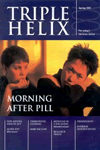Two and a half years ago, in August 1998, we held a small thanksgiving service for our Ruby fortieth wedding anniversary. Leading the singing in our family music group was our son-in-law Richard with his guitar. He was just back from the church camp and many remarked that he was radiant that afternoon.
Richard had been baptised in our church, Morningside Baptist in Glasgow, and he as a student in the early 1980s had become very involved. With our daughter, Catriona, he had been in the music group, and they were married in 1985.
Later that day, in August 1998, we set off for a family holiday in Perthshire, four children, four spouses and nine grandchildren. Just three days later our holiday came to a sad and abrupt end. Richard was knocked off his cycle, having been hit from behind by an 18 year old, inexperienced driver. Before the family could reach him he was airlifted to the Neurosurgical unit at the Southern General Hospital in Glasgow and he died the next day of irreversible brain damage.
Our daughter Catriona's fortitude and faith have been amazing from the start of the tragedy. Within minutes of hearing the sad news about the seriousness of his head injury, she made it clear that she wanted Richard's organs donated for transplantation. The Transplant Co-ordinator worked hard, but timing was tricky. Although we knew that the pressure within Richard's skull would continue to rise, no one could predict when he could be declared brain dead. Catriona wanted their four children, aged six to twelve, to come and say goodbye to Daddy, and she also wanted to be with him until he went back to theatre. Eventually the longest day came to an end and we made our sad way back to pack up our truncated holiday.
Exactly one year later, a man called Gerry from Northern Ireland, wrote to Catriona. He expressed his deep thanks for one of Richard's lungs that had been given to him, transplanted on the day Richard died. Although still in his mid-fifties and in the prime of his productive professional life, a fatal lung disease, alveolar fibrosis, had reduced him to a pulmonary cripple.
He wrote that before the operation he was so breathless he could not even bend down to tie up his own shoelaces and he needed extra oxygen 24 hours a day. After the transplant he has resumed a full active life. On the day he wrote he was putting on his trainers and was about to go out on his cycle. He said that he thanks God every day for his renewed life, and he daily remembers Richard's family in his prayers.
Gerry and Catriona exchanged letters and family photographs. Then in August 2000, Catriona, her four children, my wife Margot and I went over to Derry in Northern Ireland to meet Gerry and his family. Both families were nervous but excited. Because the central characters, Gerry and Catriona, were so enthusiastic, the time together was a great success. Gerry is now 57, and he has a large and close grown up family. Their hospitality was overwhelming.
We shared the traumatic and stressful experiences of two years before and our hopes for the future. We ate, talked, laughed and walked the beaches of Donegal together. Gerry even kicked a football around the garden with our grandson Timothy.
Families grow by the joy of a marriage and the marvel of a newborn life, but we have discovered a third way, the wonder of transplantation. Our family has been enlarged and enriched by a warm and affectionate family from Ulster. We are united by a living lung that has rich memories of the past, gives vitality for the present and hope for the future.
Gerry is such a positive, and productive Roman Catholic Christian man. From humble origins he established a building business that is now widely respected for the quality and personal nature of its work.
He uses and enthuses trades people from both sides of the divided community, giving jobs and hope. He has been involved in building and rebuilding both protestant and catholic churches. He has a special way of dealing with and encouraging people, and this really shows. He has spent considerable time helping young people from both communities. He told me that he never makes a business decision without asking himself the question 'What would Jesus do?'
Among his plans for Derry and its people is a vision to develop and revitalise the neglected waterfront of the river Foyle. He repeatedly told us that without the gift of Richard's lung he could not have taken on these things, and so, remarkably, we are part of these dreams and developments.
Our impression is that Gerry has always shown a concern for others, but the gift of the healthy lung seems to have given new vision and compassion. Although we miss Richard so much, our loss has its positive side. We are happy that Richard's death was the means of bringing renewed life and hope to others. Richard was such a competent and caring person, he must rejoice that even after his death he has been able to give life and hope to others. It is providential that his personality, energy and enthusiasm seem so well matched to those traits we saw in Gerry.
The motto of one famous Scottish family is 'Saved to serve'. Gerry seems well aware of this privilege and responsibility. But in a sense, this motto is a message for all Christian people. We are all debtors to the love of God and the sacrifice of the Lord Jesus.
































